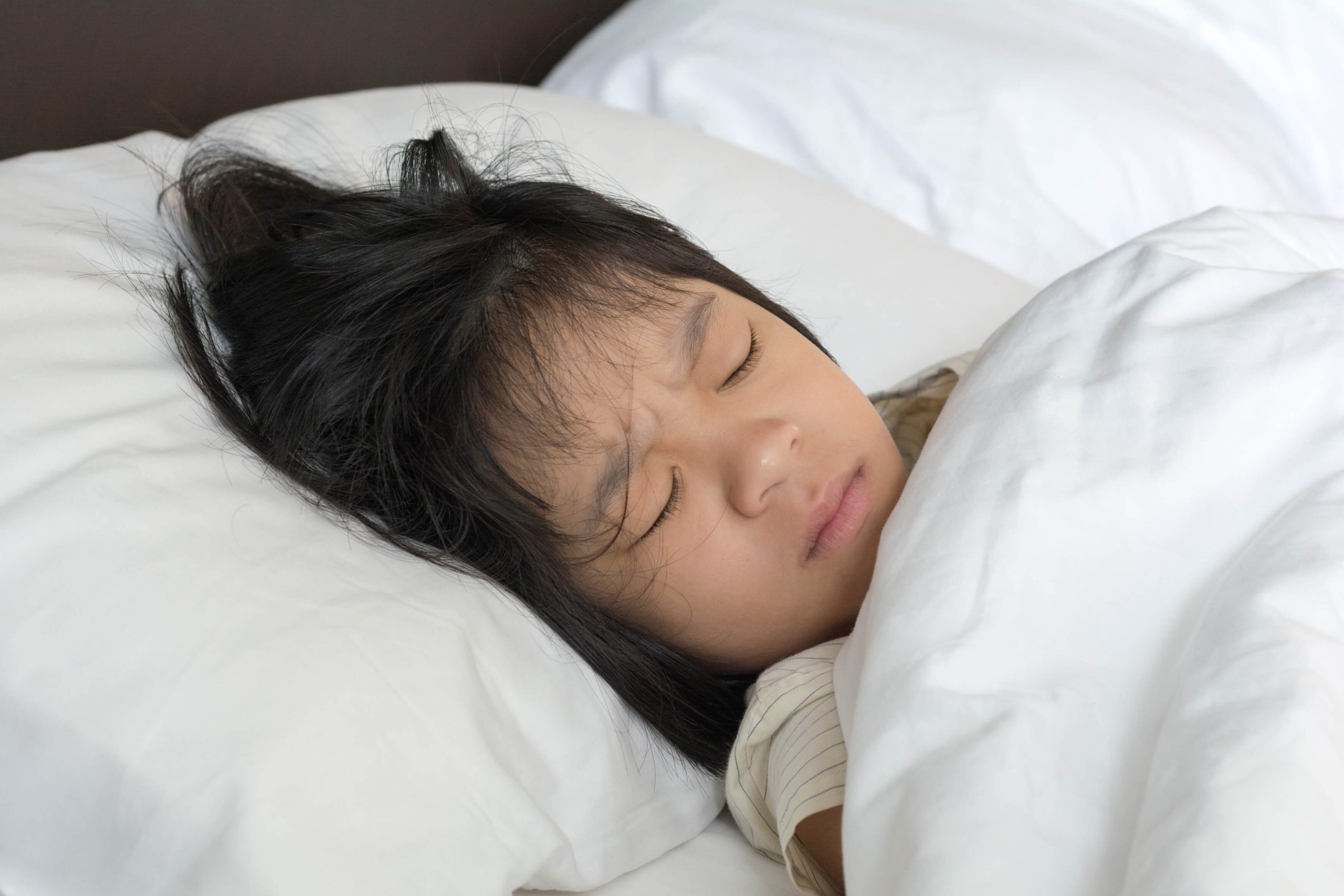Children & Parenting
Why Does My Child Keep Waking Up Throughout The Night?

Night Wakings Are Common In Both Children & Adults
Many people tend to associate night wakings with infants and toddlers, but the truth is that all healthy people, including adults, experience multiple arousals during sleep. Nobody sleeps continuously in one long bout throughout the night.
Night wakings are characterised by short disruptions in sleep cycles. Most people experience this half-waking state, typically lasting only a few seconds, before falling back to sleep on their own. As these interruptions are so brief, you might not even remember them when you wake up the next morning.
The typical sleep cycle lasts from 90 to 110 minutes. A complete sleep cycle comprises of a series of 4 stages, starting with stages of light sleep to deep sleep, and ending with the rapid eye movement stage (REM). REM is the sleep stage that is associated with dreaming. At the end of every sleep stage, you may awaken before moving into the next. You can easily awaken during and immediately after the REM stage.
Most of the time, a child who experiences a night waking remains drowsy and quietly fall back to sleep. Although night wakings are normal, it could be a cause for concern if your baby or toddler has chronic trouble falling back to sleep on their own.
Sleep Patterns In Children
Toddlers aged between one and three years need between 11 and 14 hours of sleep every 24 hour period. But this does not mean that they have to go to bed at 7:00pm and not wake up until morning. Their sleep time may be split up between nighttime and naps during the daytime.
In most cases, it will take you several weeks or even months of experimenting to discover what works best for your child. On the other hand, young children aged between three and five years need between 11 and 13 hours of sleep every day. Just like toddlers, the sleep time of young children is split between nighttime and a daytime nap. Napping begins to trail off during preschool years although most can still benefit from taking a daytime nap.
Common Night Waking Problems In Children
There are a lot of reasons why children wake up during the night. It might take you a lot of time to figure out why your toddler experiences night waking. Following are some of the common reasons.
Inappropriate Sleep Onset Association
This is one of the most common causes of night waking in infants and young children. When a child wakes and cries out at night, it is a common first response for parents to immediately attend to the child and comfort him/her.
Many parents feel the need to help their kids get back to sleep by feeding, rocking, or lying down with the child. If you do this consistently, your child does not learn to fall back to sleep on their own. Instead, many children often grow to require their parents’ presence or the same set of circumstance (feeding, rocking, patting on back etc) before returning to sleep.
Inappropriate sleep onset association is common in children aged between 6 and 36 months, but could also present in older or younger children.
To manage this sleep disorder, there are various sleep training methods parents could implement: consistent bedtime routine, consistent sleeping environment, gradually remove the presence of screens, games, and stimulating activities before sleep, and more.
Night Terror
Night terrors can be horrifying to witness for most parents. When experiencing a night terror, your child could ‘wake up’ suddenly with a scream or cry, while staring straight ahead and looking terrified.
Your child most likely will not remember the episode the next morning. While your child experiences night terror, he/she is caught in between the light and deep stages of sleep which causes his/her mind to be asleep while his/her body is awake. Night terrors usually happen before midnight.
Night terrors affect a small percentage of children and could be more common in children who are overtired or sick.
To manage night terrors, parents should not interfere with the child too much or try to wake him/her up. The most important thing to do is to keep your child safe in case he/she walks around during a night terror- secure windows, locked doors, and blocked access to stairs. You should also ensure your child has a regular bedtime and gets sufficient sleep.
Latest Articles
How Are Abdominal Hernias Treated?
What to Expect from Colorectal Surgery
How to Treat Breast Inflammatory Conditions
Gynaecomastia: Understanding Male Breast Cancer
Nightmares
Nightmares are frightening dreams that usually awaken your young one completely, common in children who are overtired or sick.
In most cases, nightmares happen after midnight, and they are different from night terrors. They occur when your child is still in the light sleep stage, he/she wakes up completely and may need to be comforted to fall back asleep.
As a parent, the best thing that you can do if your child has nightmares is to comfort him/her. Talk to him/her gently and give your little one a security object that he/she can keep in bed such as a soft toy. You should also consider leaving the lights on dimly.
Anxiety/Stress/Fear
Children with anxiety, stress, or fear may lie in bed looking worried and keep getting in and out of bed. Life changes such as the arrival of a new sibling, a new babysitter, potty training, or a change in environment can cause daytime anxiety or fear, which translates into night-time restlessness in your child.
If you suspect that your child is experiencing anxiety, take time to listen to his/her concerns and understand that fears that may seem silly to you are real to your child. Discuss their fears during the day and teach him/her how to overcome fear/anxiety.
Circadian Rhythm Disorder
All human beings have an internal clock that controls sleeping and waking. Circadian rhythm sleep disorder affects the timing of sleep. This sensitive inner clock can easily be disrupted by sudden changes in routine, which leads to an erratic sleep schedule. It means that your child can no longer go to sleep at the expected time or stay awake during the day.
If you suspect that your child has developed circadian rhythm disorder, take appropriate steps to get his/her body back to a regular sleep schedule. Choose a bed-time and wake-up time that works best for him/her and stick to the routine.
Medical Conditions
A wide range of medical conditions associated with sleep disordered breathing (SDB) such as sleep apnea, snoring, and gastroesophageal reflux (GER) may cause night wakings in children.
Sleep-disordered breathing could restrict oxygen supply to your child’s brain, and it is also associated with frequent night wakings, poor sleep quality, and increased daytime sleepiness.
SDB can contribute indirectly to night wakings by making your child more hyperactive or defiant. Make sure that you take your child for screening and treatment if he/she shows signs of SDB.
Conclusion
Continous night wakings is a problem that you should not ignore. Do not be afraid to turn down your child’s requests if you feel that it will affect your little one’s sleep patterns. The most important thing to do is to establish consistency, this is crucial in providing intermittent positive reinforcement to what you teach your child.
You should also consider consulting a paediatrician who specialises in sleep disorders in order to diagnose and help treat your child. The doctor will be able to assess your child’s condition and recommend ways of dealing with the problem.
WHO WE ARE
About SOG Health Pte. Ltd.
Established in 2011, SOG Health Pte. Ltd. (“SOG”) is a leading healthcare service provider dedicated to delivering holistic health and wellness services to the modern family.
With a long and established track record in Singapore providing Obstetrics and Gynaecology (“O&G”) services such as pre-pregnancy counselling, delivery, pregnancy and post-delivery care, the Group has since further expanded its spectrum of healthcare services to include Paediatrics, Dermatology, and Cancer-related General Surgery (Colorectal, Breast & Thyroid).
The Group’s clinics, under its four operating segments of O&G, Paediatrics, Oncology and Dermatology, are strategically located throughout Singapore to provide easy access to its patients.
- Obstetrics
- Gynaecology
- GynaeOncology
- Breast, Thyroid & General Surgery
- Colorectal, Endoscopy & General Surgery
- Dermatology
- Paediatrics
Consult With A Specialist From SOG
Visit one of our specialists today to learn more about your health!
Recommended Paediatricians
Book An Appointment
Fill up this form and our clinic will get back to you shortly.
For general enquiries, please click here.




